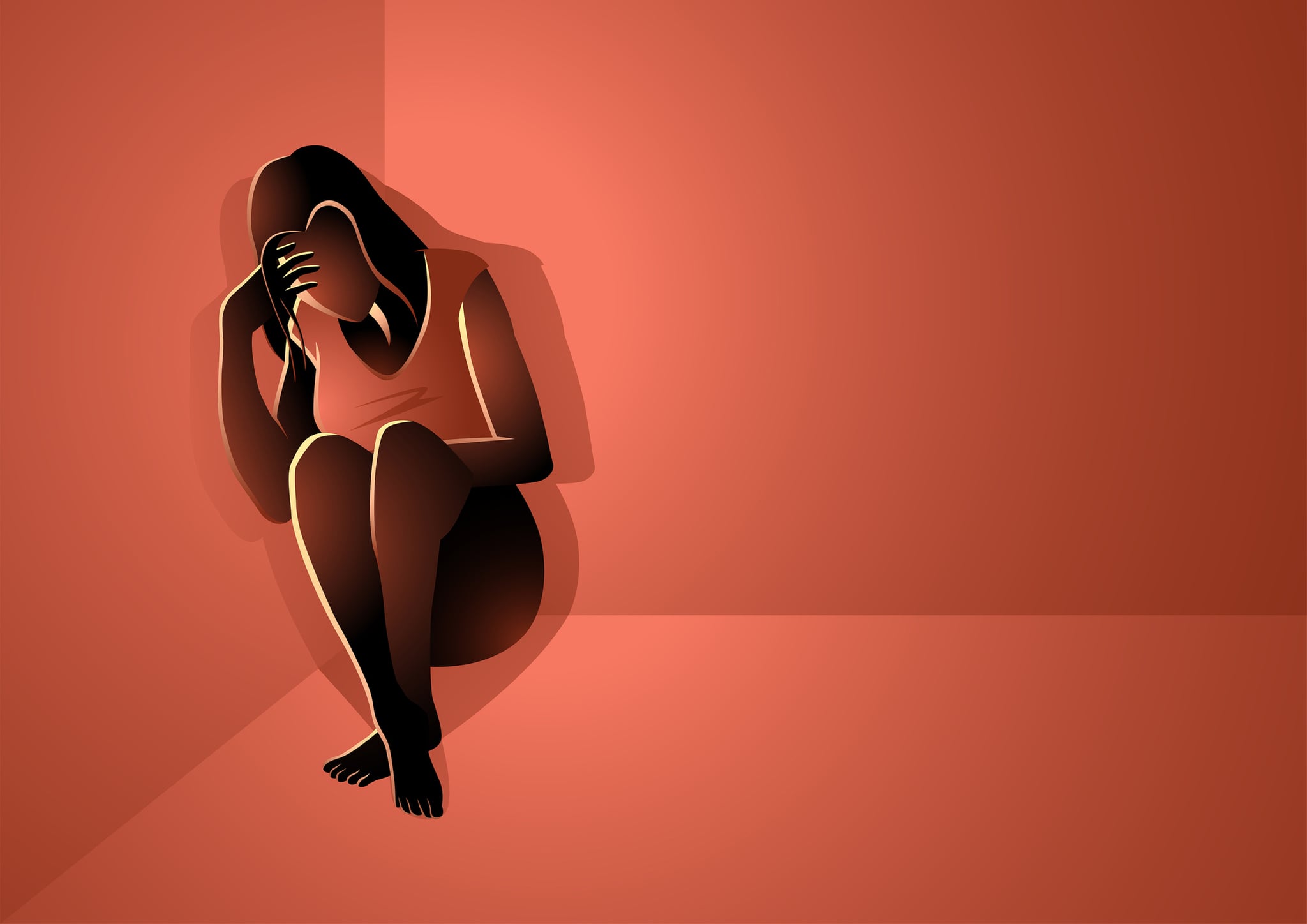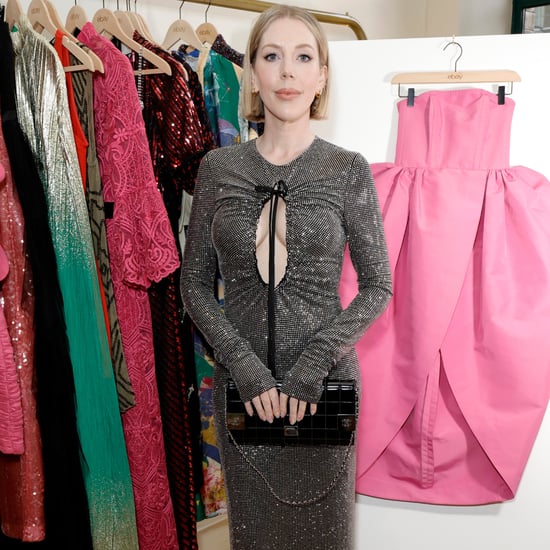Economic Abuse Survivor: "I'm Still Triggered By Finances"
Surviving Economic Abuse: "Years Later, I'm Still Triggered By Finances"

Image Source: Getty
According to Surviving Economic Abuse, 5.5 million UK women have had their money and belongings controlled by a current or former partner in the last 12 months. Not only are women more likely to experience economic abuse from a partner and at a higher rate than men, but they are also more likely to be more adversely impacted by it. "I didn't even realise I was a victim of economic abuse because I didn't know what it meant," Samantha* tells PS UK. "I'm not sure whether it was down to my age, or the lack of education around that sort of abuse at the time — but I didn't even know it was happening."
Samantha was in a relationship with her abuser for seven years from 18 until 24 years old. They shared a property and a joint bank account but her abuser was taking a lot of money out of it, leaving Samantha struggling to pay the bills and the mortgage. She explains: "He would constantly lose his job, so I would pay for everything. I'd lend him quite a lot of money as well as his family." Her abuser was financially dependent on her. "At the time, I felt like that was just something that you do when you're in a relationship — you help each other. It wasn't until I left that relationship that I realised what was really going on."
Dr Nicola Sharp-Jeffs, Founder and CEO of charity Surviving Economic Abuse, explains that there are two distinct patterns in economic abuse. "Through my work with victim-survivors over the years, some survivors tell me that the abuser played on the stereotype of men being better at managing money than women and using this to take economic control," she says. "In many cases, this is initially introduced as caring behaviour for example, by offering to take care of managing the payment of household bills because she is so busy or saying she doesn't need to work because he earns enough money to look after her and the children."
""He would constantly lose his job, so I would pay for everything. At the time, I felt like that was just something that you do when you're in a relationship — you help each other."
The other pattern is an abuser exploiting a victim-survivor's economic resources by saying she should look after him. Dr Sharp-Jeffs says: "Even if he had his own job they refuse to pay towards household costs, including childcare." She explains that both scenarios can leave a victim-survivor with low confidence and facing financial challenges when it comes to rebuilding their lives independently.
In 2019, 24-year-old Samantha decided to leave the relationship after he lost their joint bank card and demanded more money. "Something switched in me after that and I ended things," she says. "At the time I thought the split was amicable — but I soon learnt that it wasn't."
Samantha moved back to her parents' house and attempted to sell their joint property but he did everything he could to prolong the process. She says: "Every time I went back to the house, he'd make sure the property was in a state so it wasn't up to standards for estate agents." Samantha was paying for the mortgage and bills even though she wasn't living there. Her abuser refused to pay towards the bills, sell or even leave the property, which forced Samantha to keep paying to keep her credit score intact. "I was trying to keep it amicable but we had a number of altercations and his family were also harassing me so I couldn't return to the property for my own safety."
Another huge issue Samantha faced was the lack of support and education on economic abuse from her bank. The first missed payment on the mortgage was in October 2020, and even after letting them know from the outset about her toxic situation, they still told Samantha that she was liable to pay the mortgage.
"Through my work with victim-survivors over the years, some survivors tell me that the abuser played on the stereotype of men being better at managing money than women and using this to take economic control."
"The bank started bombarding me with phone calls every other day asking, 'Why aren't you paying?' and I had to keep repeating my story." The constant contact from them started to affect her mental health. "At that time, I was extremely anxious and I was struggling to leave the front door because I was just scared about what might happen. It was very triggering, getting constant phone calls and generated letters from the bank as well as having to re-tell my story to different people."

Image Source: Getty
She also believes it would have been easier to speak to a female customer support officer. Samantha says: "A lot of the time it was male customer support. I've got no issue with men or speaking to men but at the time, it was a very vulnerable thing to have to open up about. I was always crying and I felt like they didn't know how to deal with it."
After finding out it would take £15,000 to sell the property without his permission, she decided to push for the property to be repossessed. However, it was taking so long that she had a missed payment on her credit score every month for three years. Samantha says: "I had a perfect score but after all that, his name was constantly linked to my credit score. I couldn't open a new bank account, get a loan or a car. I was even struggling to get a rental agreement because I had a poor credit score and it made it look like I couldn't afford to pay."
Samantha finally repossessed the shared property in January 2023, with a remaining debt of £12,000 pounds. The bank eventually decided to write the debt off due to the poor treatment she received from their customer service team, but Samantha's credit scoring was completely ruined. After appealing to the Financial Ombudsman Service, they cleared the scoring completely. There were other issues that remained with her credit score, but the main mortgage issue was cleared. "I was lucky — unfortunately not everyone is so fortunate," she admits.
Samantha later went to a local charity who helped her realise that she had been through abuse. "When I got told, I still second guessed it. I was questioning, 'Is this abuse or am I exaggerating?' In 2019, there was hardly any information on the bank's website about it and I felt like it was a very taboo subject in my area — none of my family knew what it was." Samantha explains that there were many other survivors she's met who have also struggled to define economic abuse because it wasn't physical. "It makes sense though since economic abuse wasn't recognised in the Domestic Abuse Act until 2021, this is all still fairly new."
I was extremely anxious and I was struggling to leave the front door because I was just scared about what might happen. It was very triggering, getting constant phone calls and generated letters from the bank."
Dr Sharp-Jeffs explains that it's only been 50 years since women were allowed to take out a mortgage on a home without a male guarantor or get a credit card in their name. "It's no wonder that economic abuse is so prevalent when women's economic inequality has been hard-wired into our society. While we may have taken huge strides forward in women's economic empowerment, we still have a gender pay gap and we still see deep-rooted attitudes around
men and women's roles when it comes to money and finances."
Six years later, Samantha is in a new relationship but she still struggles with financial triggers. "I'm very touchy with finances," she admits. "My partner loves me very much and I've known him for years so it does help with trust. But with finances, I still do get very triggered." For Samantha, the last thing she wants is to be back in that dark place where she felt completely out of control. "If I have to pay out for something, for example taking out a huge chunk out of my savings, it's really triggering," she says.
"Now, I have to have a back-up lump sum of savings. If I don't, I really struggle mentally because then I feel like I'm back to square one." Samantha explains that she has a joint bank account with her new partner: "If I say to my partner, 'You've been paid, can you transfer the money over?' and if he doesn't do it there and then, even though he shouldn't need to do it, I do sometimes get really triggered by that."
Dr Sharpe-Jeffs tells PS UK that the only way to stamp out economic abuse is to change attitudes within society: "While we need to make sure that every survivor gets the help she needs and abusers pay the price for their abuse, we also need to educate society, and especially the next generation, on economic abuse. As part of this, we need to challenge the attitudes about men and women's roles so that we achieve women's economic equality and stop economic abuse forever."
* Names have been changed.
You can hear more from Nicola Sharp-Jeffs MBE as she joins Malin Anderson to discuss financial abuse and how to spot the red flags on the latest episode of Experian's 'Cost of Loving' podcast, hosted by Celebs Go Dating therapist Anna Williamson. The five part podcast series is available on Spotify, Apple and all major streaming platforms now.
Aaliyah Harry (she/her) is the associate editor at PS UK. She writes extensively across lifestyle, culture and beauty. Aaliyah also has a deep passion for telling stories and giving voice to the voiceless. Previously, she has contributed to Refinery29, Grazia UK and The Voice Newspaper.






